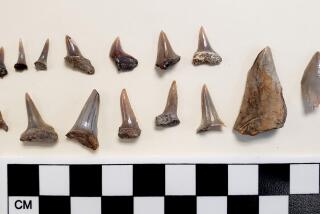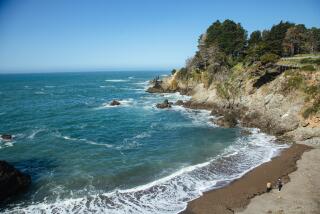John D. Cooper, 68; Cal State Fullerton geologist curated Orange County fossils
- Share via
John D. Cooper, a Cal State Fullerton geologist who was widely known for his research on the evolution of eastern California and for curating a significant collection of fossils that were unearthed during the development of Orange County, has died. He was 68.
Cooper died Monday of a heart attack suffered during a morning hike near his Chino Hills home, said his wife, Nancy.
By painstakingly studying ancient sedimentary rocks and the fossils they enclosed, he documented how eastern California transitioned over millions of years from a marine environment to being part of the continental land mass, said Diane Clemens-Knott, who until recently headed the Cal State Fullerton geology department.
Cooper was recognized as an international expert in sequence stratigraphy, a relatively new branch of geology that attempts to link prehistoric sea-level changes to sedimentary deposits. Much of his work was done in the eastern Mojave Desert and southern Great Basin.
“He did world-class research, but he always brought it back to the people,” David Bowman, chairman of Cal State Fullerton’s geology department, told The Times on Friday. “He was deeply involved in a number of very important projects.”
Among them was setting up a curatorial system to deal with the estimated 500,000 to 1 million artifacts that had been kept in local warehouses beginning in 1978 after being uncovered by bulldozers. Remains as tiny as prehistoric rodent teeth and as huge as a whale’s spinal column are among the fossils from the Miocene epoch, a period in geologic history that spanned from 25 million years ago to 5 million years ago, when California was underwater.
“The county arguably is in the possession of the largest raw collection of fossils on the planet,” Cooper told The Times in 2005.
He began managing the collection, known as the Orange County Archaeological-Paleontological Curation Project, in 1999. After retiring from Cal State Fullerton in 2002, he continued trying to find a permanent home for the collection, which might include a permanent role for the university.
For more than 30 years, Cooper used Shoshone, Calif., a village at the southeastern edge of Death Valley National Park, as his base for field research. He gave back by developing exhibits for the Shoshone Museum and serving as president of its board of directors.
In Brea, he helped establish the Olinda Historic Museum and Park and helped develop geologic exhibits related to Olinda, a once-bustling oil town.
John Doyne Cooper was born June 12, 1939, in Wichita, Kan., to Byron Nelson Cooper and the former Willie Elizabeth Doyne.
After growing up mainly in Blacksburg, Va., where his father taught geology at Virginia Tech, Cooper received a bachelor’s degree in geology from the University of Michigan in 1961. At the University of Texas, he earned a master’s degree and, in 1970, a doctorate in geology.
He came to Los Angeles in the late 1960s to work as an exploration geologist for Shell Oil and began teaching at Cal State Fullerton in 1970.
A popular professor, Cooper was recognized by the Geological Society of America for making the intellectual enrichment of his “armory of principally undergraduate student ‘colleagues’ ” as important as his research.
“He was an Eagle Scout and lived his life like one,” his wife said. “He was honest, trustworthy, caring.”
In retirement, Cooper attended many events related to the bicentennial celebration of the Lewis and Clark expedition of 1804-06. He also indulged in trail hiking and logged more than 5,000 miles, mainly in the hills around his home.
In addition to his wife, whom he married in 1976, Cooper is survived by a daughter, Chaska of Burbank; son Zachary of Fullerton; stepson Randy Thompson of Chino Hills; a sister; and a grandson.
Donations may be made to Cal State Fullerton’s John D. Cooper Field Camp Award: www.fullerton.edu/supportCSUF/ geologyrocks
--
More to Read
Sign up for Essential California
The most important California stories and recommendations in your inbox every morning.
You may occasionally receive promotional content from the Los Angeles Times.













